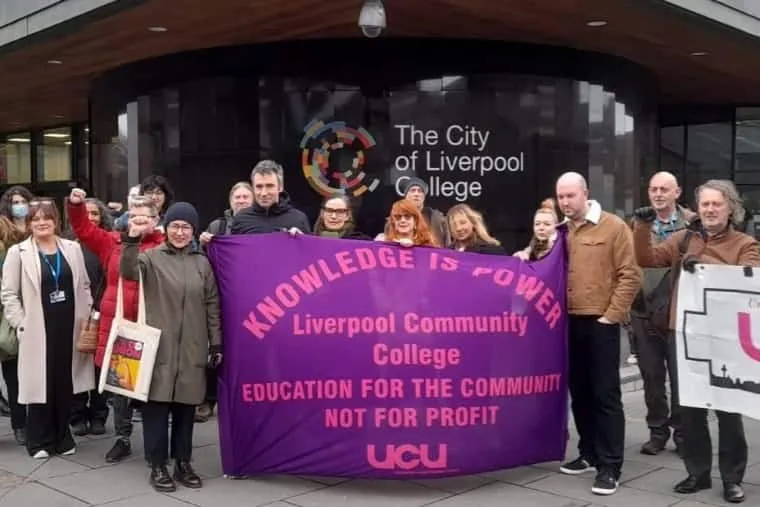At City of Liverpool College, the teachers are at war with the management

Allegations of staff mistreatment, trade union victimisation, and more students than chairs
Dear members — “It’s hard to overstate the importance of [City of Liverpool College] in Liverpool,” Jack Walton writes at the beginning of today’s article about the growing tension between teachers and management at the city’s only further education facility. After the sacking of a teacher (and union rep) in March, a week-long set of protests were held by staff during lunchtimes. But this would prove to be just the beginning of a story involving allegations of bullying; the stripping back of valued services and reports of class sizes doubling.
Our Thursday edition is, as always, for members only, but readers on the free list will be able to view the top of this email, and should join up as members now if they want to read the rest and support the future of independent journalism in Liverpool and the rest of the city region. If that’s you — and you’ve already got one foot in the door — why not come on in, take off your coat, have some mulled wine and a mince pie and enjoy a cracker of an edition.
Your Post briefing
Steve Rotheram’s plans for a tidal power plant in the Mersey have been boosted by a new agreement with South Korea's state water company, which runs the Sihwa Lake tidal power scheme. Sihwa Lake is the world's largest tidal power plant and “generates 552GWh of clean, green energy every year, replacing the equivalent of 862,000 barrels of oil a year” according to the BBC. The new agreement would be to “share lessons” and glean advice from the minds behind the highly ambitious project. Rotheram isn’t reaching for the champagne just yet though, and admits the government’s financial support will be required if his project has any chance of going ahead. "This is an achievable and realistic scheme but nobody's taken it seriously," he told BBC Radio Merseyside. Experts predict the project — if green-lit — could take a decade to complete, but would mean cheap energy for 100 years.
Warrington Borough Council sent their biggest ever commercial loan by mistake to entrepreneur Matt Moulding, having approved it to the ecommerce group (named The Hut Group) Moulding founded. The loan was worth £202 million and an internal report was drawn up “repeatedly” describing THG as the borrower and talking about the company’s financial strength. According to the Financial Times, it called THG a “proven business model centred around recession-proof products” and talked about the strength of its credit rating. In actuality, the loan was then sent to an entity called Icon 3 Holdco and three borrowers (all owned by Moulding). The Financial Times obtained the report via a Freedom of Information request and note how it makes no mention of Moulding or the fact that he, rather the THG, controlled the entities being sent the money.
Frank Cottrell-Boyce, Jimmy McGovern and a number of other established Merseyside writers and artistic voices have signed a letter rallying against the BBC’s plans to “de-localise” local radio stations. The plans, which would affect BBC Radio Merseyside, propose scaling back the number of shows on each regional station and having some shows shared between multiple stations. The letter — which appeared in The Times — called the plans “the death knell of localness” and said that “vulnerable people” rely on their stations in times of crisis. It concluded: “BBC bosses are out of touch with local radio listeners like us”.
90-year-old carer Mary Houghton is celebrating the 75th year of her career. Houghton started out at a hospital in Southport in 1948, aged 16, after coming to England from Ireland and went on to become an auxiliary nurse. She worked there until her retirement when she was 60, before rejoining the workforce within a week, this time as a carer at the Tudor Bank Nursing Home (also in Southport). She was honoured for her work at the 2022 Caring UK Awards on Thursday. Houghton told the BBC that she’s often mistaken for a resident at the care home, but doesn’t mind caring for residents younger than she is. “I don't feel old because they don't make me feel old,” she says.
Post Picks
👂Listen to this fascinating BBC 4 Radio documentary about the Eldonian Village in Vauxhall, a pioneering community of social housing where residents seem to have been sold out. Investigative journalist Matt O’Donoghue follows the money and finds once-community owned assets sitting in faceless offshore firms. NB: The BBC aren’t the only ones who have been doing some digging into the Eldonians…
📚 A tribute to George Harrison at the University of Liverpool’s Tung Auditorium next Wednesday, courtesy of none other than his wife, writer and producer Olivia Harrison. Olivia will read from Came the Lightning, a book of twenty poems “examining the phenomena of losing a partner” to mark the twentieth anniversary of George’s passing. Tickets are £10.
🇾🇪 Hope Street Harmonies are playing their annual Christmas concert (and raffle) in aid of only functioning paediatric hospital in war-blighted Yemen, Al-Sabeen Children’s Hospital, who we wrote about back in April. Bring cash for raffle tickets. General admission £9.
Before she was sacked, Nina Doran felt she was at the peak of her powers. She’d been teaching at The City of Liverpool College for 28 years, long before it even had that name. And she was good at it. “I loved my job,” she says. In the eyes of one colleague, “Nina was one of the very best we had.”
Her sacking — in March this year — came as the latest in a long line of incidents of concern to staff at the college. A dispute between the college and the union representing many of them, the University and College Union (UCU), had been raging on for months over pay and conditions. As she was a union rep, some felt Doran had been targeted.
A week-long set of protests was held during lunchtimes in March, shortly after the sacking, to challenge her dismissal. The protesters brandished banners that suggested a shift in the college’s purpose: “education for the community not for profit” and the incident made the national press. It appeared that two stories were playing out on parallel tracks. One, the sacking of a much-loved teacher. The other, that a far deeper malaise had set in at one of the city’s most valuable institutions.
Doran’s dismissal raised particular alarm for two reasons. Firstly, she was the fourth union rep to be sacked in eight years. Secondly, her initial suspension had come only a week before the longest strike action the union had prepared to that date. As the chief negotiator in the pay dispute, Doran had been at work campaigning and organising reps. The college says she was sacked for a “breach of confidence”. We can’t go into the details of the incident for legal reasons, but Doran believes she was unfairly sacked and her union says they are fully supporting her at her upcoming tribunal next year.
As an isolated case, Doran’s story alone doesn’t amount to evidence of anything, but UCU have claimed it is the latest incident in a “pattern” of dismissals. And the issues seemingly run deeper than that.

We’ve spoken to ten staff at the college in the past few weeks. Of course, with any employment dispute, interviewing ex-employees is likely to result in some bad-tempered testimony. But certain patterns and consistent claims emerged in our interviews. The sources allege that CoLC has become a place where teachers are poorly treated by their managers, finances are mismanaged and unionised staff are victimised. We have put all of these allegations to the college, which they staunchly deny.
The college told The Post that “these claims present a grossly inaccurate misrepresentation of The City of Liverpool College, made by a very small number of staff, past and present”. They said the College “is committed to ensuring all staff, regardless of pay grade, union membership or identity, enjoy the right to be treated respectfully and fairly.”
It’s hard to overstate the importance of CoLC in Liverpool. Being the only further education facility in the city, it plays a crucial role, catering to 16 year olds stepping out of school in the hope of more vocationally-oriented study as well as adults looking to retrain and change career paths. In an interview with Downtown in Business two years ago, principal Elaine Bowker said the oldest student on campus was 80.
In the days of ex-principal Wally Brown, who served in the role between 1992 and 2008, the college was transformed into a highly respected place of learning. He led the college to an “Outstanding” grade at Ofsted and later received the Freedom of the City for his efforts. He is described by one staff member as a “giant among educators”, who continues: “he had this way of talking to you that made you feel like you were walking on clouds.” When receiving an honorary degree from Edge Hill University in 2014 he was described as “one of the most important individuals in Liverpool’s history”.
But the Brown era is now a distant memory. 11 years ago, the college appointed a new leadership, led by principal Bowker. “They wanted to make fundamental changes to how we operated,” Doran says. The old name, Liverpool Community College, was chucked out for the newer, more businesslike one: City of Liverpool College. A period of upheaval ensued.
Liverpool deserves great journalism. You can help make it happen.
You're halfway there, the rest of the story is behind this paywall. Join the Post for full access to local news that matters, just £7/month.
SubscribeAlready have an account? Sign In

Latest
The unexpected auction: A London fund manager is selling Merseyside homes from under their tenants
Northern Powerhouse Rail is back on track. We think...
The clockmaker of Wavertree
One of Merseyside’s oldest sports clubs still plays every Saturday
At City of Liverpool College, the teachers are at war with the management
Allegations of staff mistreatment, trade union victimisation, and more students than chairs